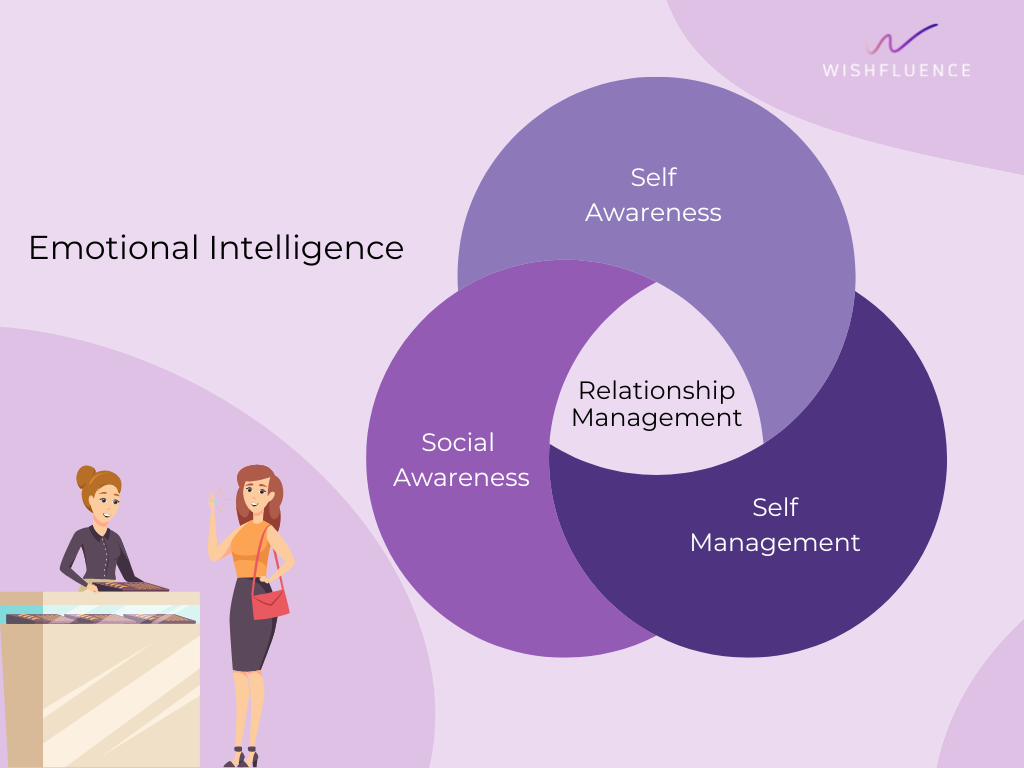Emotional Intelligence in Sales Part 1
Some things you’re born with, some things you can learn. Emotional Intelligence, the art of turning your emotions from an unwanted nuisance to a necessary resource, is something you can learn, and it is a critical component in mastering sales. In this mini-series by co-founders Andy and Carin Martin of Wishfluence, a software company which helps jewelry store staff realize their sales potential, we will walk through foundational components of Emotional Intelligence in sales for any industry. Let’s get started.
Some might say, “Emotions are terrible, they always get in the way.” That’s partly true, they do always get in the way and here’s why. Primary senses enter the brain from the spinal cord and travel to the front of the brain, the part of the brain that thinks rationally. Along the way, these senses pass through the Limbic System, the part of the brain that feels emotions. So, yes, the emotions always get in the way before the decision making portion of the brain has a chance to respond. As such, it’s impossible for your brain to respond to a situation logically before it responds emotionally.
Image via “Emotional Intelligence 2.0.” Bradberry and Greaves. 2009.
Some might think, “I can ignore my emotions, then I am always able to respond logically.” That’s not true. In a basic sense, the more you ignore your emotions, the stronger they become, until they overwhelm the decision making portion of your brain. Think of a time you responded to a situation poorly. Maybe a dissatisfied customer yelled at you and you got angry and defensive, instead of practicing skills to de-escalate the situation. A small few ignore logic and only respond to their emotions. That will likely lead to responses seeming like those of a child. You need to glean as much as you can from your emotions and then use the logical part of your brain to make decisions.
Let’s talk about what connects emotions to logic. It’s practice! In this series, you will learn how to read your own emotions and sense the emotions of others. Through this process, you will grow your emotional responses and empower yourself to make better decisions in every situation in your life and in sales. Take some time to think about that, and we hope you continue forward in the series.
There are four components of Emotional Intelligence.
Self Awareness
Self Management
Social Awareness
Relationship Management
Self Awareness is the ability to understand your own emotions. It’s what helps you process why you’re scared, “Oh the lights are turned off,” or more specifically in sales, “Oh, they might say ‘no’ to my closing ask.”
Self Management is the ability to make a logical decision that counters some sort of emotional response. It’s what helps you grab a glass of water instead of a sugary drink after bad news. In sales, it’s what helps you reach out to another customer after getting a painful email.
Social Awareness is the ability to understand the emotions of others through nonverbal cues. It’s what helps you know when to turn the customer over to another staff or to go for the add-on sale.
Relationship Management is the sum of Self Awareness, Self Management, and Social Awareness. It’s what allows you to make a self-deprecating joke when something goes wrong instead of pointing your finger at someone and blaming them for the situation. In sales, it’s what allows you to be present and focus on the customer’s needs, instead of your own. Aren’t we all in the jewelry industry because we have a desire to connect to people and ultimately be helpers through life’s milestones? Knowing your customer will improve your relationship management skills. This can be made easier with technology, and picking the right digital solution is something many in the industry plan to do this year.
We’ll go into these emotional intelligence concepts further in the next series, but we encourage you to think about your emotions for the next several days. Ask yourself why you are feeling a certain way, you may be surprised to learn that you know exactly why.
Self Awareness Practice: Aligning Values and Actions
Stores and their staff have core beliefs, principals, and mission statements that guide their business and interactions in their community. There are several jewelry industry organizations such as the American Gem Society, Gemological Institute of America, Jewelers for Children, to name a few, that also hold their members to ethical standards and values. These external values can guide business, but what about our individual, internal values and beliefs that we want to live by.
To practice self awareness, divide a piece of paper in half. On the left side write your own personal values and beliefs that you want to live your life by. On the right side write a time when you handled a situation in a way that you are not proud of or in a way that was out of character. Ask yourself did my actions align with my values? What could I have done differently?
Self awareness means taking an internal look at our emotions and how they impact ourselves and others. This practice can help you remember to respond in ways that uphold your own values and core beliefs.
Wishfluence Connection - Knowing your customer will improve relationship management. This is made easier with Wishfluence, where all of your customer’s important dates, family, preferences, and wishlist items are at your fingertips.




